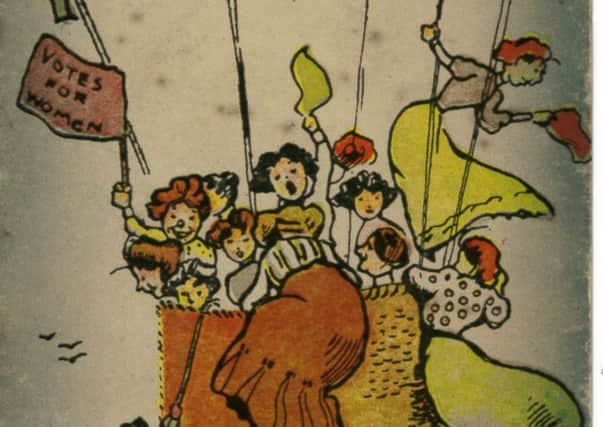The night of the vanishing women


In the iconography of the suffragette movement, the images that come most readily to mind are of women chained to railings, force- feeding, street battles with the police and perhaps most potent of all – Emily Wilding Davison stepping out in front of the King’s horse at the Epsom Derby in June 1913.
However, there were many other acts of quiet civil disobedience – such as non-payment of tax – during the lengthy suffrage campaign and a new book, Vanishing for the Vote, by Halifax-based author and academic Jill Liddington explores a little- known event that took place in the spring of 1911 when suffragette organisations around the country urged their members to boycott the census that was due to take place on the night of Sunday April 2. They argued – not unreasonably – that women should not feel obliged to comply with the law when they were denied the right to vote.
Advertisement
Hide AdAdvertisement
Hide AdIn 2009 the National Archives released the 1911 census schedules and Liddington, who has been researching and writing about Votes for Women since the 1970s, set to work.
“For suffrage historians like myself, the 1911 census was an absolute dream,” she says. “Suffragettes had been on hunger strike in prison since 1909 and the Prime Minister, Asquith, had introduced forcible feeding 18 months before the census was taken so the antagonism between the Liberal government and the suffragette movement was at its most intense.”
What was also remarkable about this census was that it was the first time that the forms were completed by the head of the household – previously they had been copied out by enumerators.
“It was a gift that we could read the words of the suffragettes,” says Liddington. “This time each household was vividly speaking to us and they had things to say.”
Advertisement
Hide AdAdvertisement
Hide AdOn many of the schedules were written the words “No Vote No Census” and often other statements were added. Elizabeth Thompson, headmistress of a small private girls’ school in Ilkley which she ran with her four sisters, wrote eloquently: “If you expect women to fulfil duties, give them the rights to which, by the performance of their duties, they are entitled.”
Many women who supported the suffragette movement went to great lengths to avoid taking part in the census, literally vanishing for the night. Liddington’s hugely engaging account presents several interesting examples such as the group who camped out overnight in caravans on Wimbledon common or those who took part in organised entertainments like the one at Aldwych Skating Rink in London, attended by 500 women and 70 men.
However, others, despite their allegiance to the cause, decided on the night to comply with the census.
“Social class has a bit to do with it – the government had said there would be a fine of £5 on those who didn’t supply the correct information,” explains Liddington. “For a doctor or the wife of a wealthy businessman that amount wasn’t very significant, but for a woman working in the textile industry or as a domestic servant that would be a month’s wages.” In addition the government was pushing through its Health and Welfare Reform – which would help future generations of women and children – and they needed accurate information, particularly on infant mortality. Women who worked in the medical profession therefore had a tough decision to make. On the whole, says Liddington, the boycott was a success.
Advertisement
Hide AdAdvertisement
Hide Ad“It was one of those odd confrontations where both sides won. The government got the population figures they wanted, but not a single evader was fined £5 and they got amazing publicity. The government won with the statistics but the suffragettes captured the headlines.”
• Vanishing for the Vote, published by MUP, £16.99.